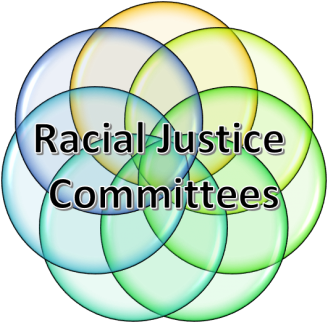 The Duke University School of Nursing (DUSON) Dean's Office and Office of Diversity & Inclusion charge the Racial Justice Task Force, to engage the DUSON community, in developing and/or making recommendations to improve individual and system structures to address racial injustices and/or inequities which exist currently within DUSON.
The Duke University School of Nursing (DUSON) Dean's Office and Office of Diversity & Inclusion charge the Racial Justice Task Force, to engage the DUSON community, in developing and/or making recommendations to improve individual and system structures to address racial injustices and/or inequities which exist currently within DUSON.
The Racial Justice Task Force will work with the Dean and Associate Dean for Diversity & Inclusion to support DUSON's goal as outlined in the DUSON Office of Diversity & Inclusion Framework. This task force will identify and make recommendations to advance racial justice in areas of equity accountability, performance measures and training recommendations fro the DUSON community.
Racial Justice Task Force Guiding Principles
-
Equity, equality and justice forms the foundation of our work.
-
As a task force, we will address the most complicated and difficult issues surrounding racial justice and will not be satisfied with addressing the easiest issues to resolve.
-
The voices and perspectives of all DUSON community members, especially those with lived experience, guide our recommendations.
Racial Justice Task Force Phases
- Recommendation Development
- Five Racial Justice Task Force groups developed
- Ongoing community engagement with process
- Recommendations developed and moved to Racial Justice Committees for Strategy Development
- Strategy Development
- Nine Racial Justice Committees developed
- Ongoing community engagement with process
- Once the strategies are developed they will be moved to the Racial Justice Implementation Team
- Implementation
- The Racial Justice Implementation Team serves as one large committee but will divide up the strategies for implementation
- Evaluation of the strategies is also identified by the strategy development group and implemented by the RJ Implementation team

After utilizing Design Thinking as a problem identification tool, the below committees were formed in order to thoroughly address the different themes identified by faculty, staff and students of the school. Visit the respective areas below to learn more about objectives and recommendations. View the status of each respective area here (a netid is required to view this page).
Objectives
- Examine our practices of holding community members responsible for racial injustices in all programs and settings
- Determine practices to ensure that community members continue racial justice knowledge development
Recommendation
- Develop processes for managing injustices as they occur
- Develop process for holding members accountable for racial justice behavior on annual/semester evaluations
- Hold members accountable for participation in racial justice training/activities
Objectives
- Understand educational practices that currently exist in all DUSON curricula to increase the understanding of racism and racial inequities past and present
- Determine effective processes for managing micro and macro aggressions in all DUSON learning environments
Recommendations
- Create a DUSON-wide and community-partner compact that clearly outlines our individual and collective commitment to identify and address bias, racism, and microaggressions
- Intentionally include curricular content that addresses bias, racism, microaggressions, health disparities, and antiracist training in every semester of every DUSON program of study
- Provide each CI/preceptor/faculty member/staff member with training on how to recognize/address microaggressions, bias, and racism
- Develop an organized formal system to hold faculty, clinical instructors, lab instructors, staff and preceptors accountable for behavior that is micro-/macro-aggressive, biased and racist
- Create a clear screening/reporting process for HR to evaluate and address reports of microaggressions, bias or racism
Objectives
- Determine organizational barriers to recruiting minority faculty
Recommendations
- Allocate funds to advertise and recruit diverse faculty to strive for as inclusive a candidate pool as possible
- Ensure search committees include underrepresented minorities (URMs) when equitable representation is not achieved, consider URMs in other schools, departments, and alumni
- Ensure a strong pool of URM candidates for all faculty positions
Objectives
- Determine organizational barriers to recruiting and retaining minority staff
Recommendations
- Allocate funds to advertise and recruit diverse staff to strive for as inclusive a candidate pool as possible
- Ensure search committees include underrepresented minorities (URMs) when equitable representation is not achieved, consider URMs in other schools, departments, and alumni
- Ensure a strong pool of URM candidates for all staff positions
Objectives
- Understand current problems related to resource allocation for minority students
- Understand barriers to sense of belonging/socialization and retaining minority students
Recommendations
- Assess how the lack of a "sense of belonging" is affecting student retention or delaying program completion
- Support activities for diverse student groups that provide opportunities for students to develop a sense of belonging
- Facilitate development of "student belonging" informed by staff, faculty and students at DUSON
- Provide faculty, staff and students with educational and other resources that promote mentoring relationships
- Create a formal committee of staff, students and faculty with additional training in racial justice and mediation techniques, for students to use to de-escalate situations between parties perceiving racial bias
- Increase awareness of what we want the narrative at DUSON to be
- Expand the services of student success center to assist with academic progress and success and make it a hub for students to obtain resources
- Develop the structure/framework to support the advisement and mentoring needs of students within the student success center
- Create a formal reporting system that allows students to report any harassment or discrimination they have experience or observed, and develop a comprehensive, accountable, and transparent process for undertaking investigations
Objectives
- Determine advancement and promotion processes that are not equitable for faculty
- Determine if salary inequities exist and potential practices that allow for these inequities
- Determine equity of cultural resources allocated for faculty
Recommendations
- Analyze all faculty exit interviews by race/ethnicity
- Establish formal mentoring initiatives for non-regular (NRR) faculty that are consistent with regular rank faculty
- Conduct an annual "pulse" survey of the entire DUSON community to gain a better understanding of perceptions of inclusion and belonging
- Practice partial salary transparency of regular rank and non-regular rank faculty salaries
- Conduct an analysis of full-time regular rank faculty salaries based on race and gender within each track
- Determine best practice for establishing per course, per credit increase in compensation for NRR faculty
- Examine access to and allocation of resources complementary to scholarly productivity
- Investigate the rate and timing of promotion from assistant to associate and from associate to full professor by track and within divisions
Objectives
- Determine advancement and promotion processes that are not equitable for staff
- Determine if salary inequities exist and potential practices that allow for these inequities
- Determine equity of cultural resources allocated for staff
Objectives
- Determine current challenges related to holistic admissions for each program
Recommendations
- Develop a comprehensive recruitment program focused on increasing the pool of diverse applicants at DUSON
- Develop DUSON level standards for holistic admission: policies, evaluation and reporting of admission data, faculty training on holistic admission including assessment of bias
- Address the need for financial supports needed by diverse student groups
Objectives
- Identify the most effective mandatory training(s) for all DUSON groups
- Determine how to most effectively mitigate bias within DUSON (all locations, communities)
- Determine effective processes for reporting
Recommendations
- Mandatory training for all-different tiers of training/educational experiences based on intensity, focus and accessiblity
- Monitor engagement and outcomes with each learning activity to determine compliance with and effectiveness of the trainings